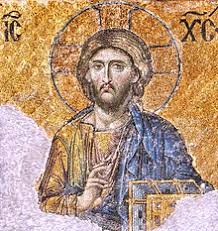
That’s the subject of my book. In short, ancient Hebrews and Greeks underwent the shift in consciousness Barfield describes, and that prepared the way for Jesus.
Amongst the ancient Hebrews, the change began in the momentous century that featured the northern and southern kingdoms exiles in Babylon and ended with the return to Jerusalem. It was the age in which the Bible was first written down, and the prophets first formulated a clear doctrine of monotheism. The withdrawal of participation was manifested most directly in the ban on idols. The beginnings of a new way of participating in nature and the cosmos began with reflections upon the nameless name originally given to Moses: Yahweh’s tremendous “I AM”.
Amongst the ancient Greeks, the epochal shift began a few decades later, in the fifth century BCE. It was the age in which figurative sculptures seemed to wake up; human personhood and individuality became a fascination for playwrights; and a novel sense of the cosmos gripped the first philosophers, who also wrestled with the crisis of meaning that ensued. The withdrawal of participation was felt in the experience of having a conscience and of quarrelling with gods. The beginnings of a new way of re-participating began with reflections on how to care for the soul, and thereby cultivate a self-conscious relationship with what is good, beautiful and true.
It’s at this point that we get to the significance of Barfield’s discoveries for Christianity.
According to him, the evolution of consciousness did not settle into a fully flourishing reciprocal consciousness in the Hellenistic world, for all the genius of the ancient Greeks and Jews. That took a further event, which had in fact begun to be expected by some of them.
The full implications of the subtle shifts that, by then, were unfolding inexorably had to be incarnated. To be wholly realised, the inside of the cosmos needed to be manifested, not in the ideas of powerful teachers but in the life of an individual. Only then, could the process of disentangling the inner life of human beings from the inner life of nature turn about, like a tide, and become the process of reconnecting the inner life of newly individualised humans.
This is the central meaning of Christianity. It is why it was experienced as a liberation. It is its secret life – and is also so potent for our task now: to rediscover a lost soulfulness and vitality.
We can become consciously and wholly orientated towards the divine that is within us. I don’t think that will come about in the ways that modern Christians often expect it will. First, we need to absorb what Barfield and others have discovered about consciousness, its evolution, and its potential. It’s the driving concern of my book.